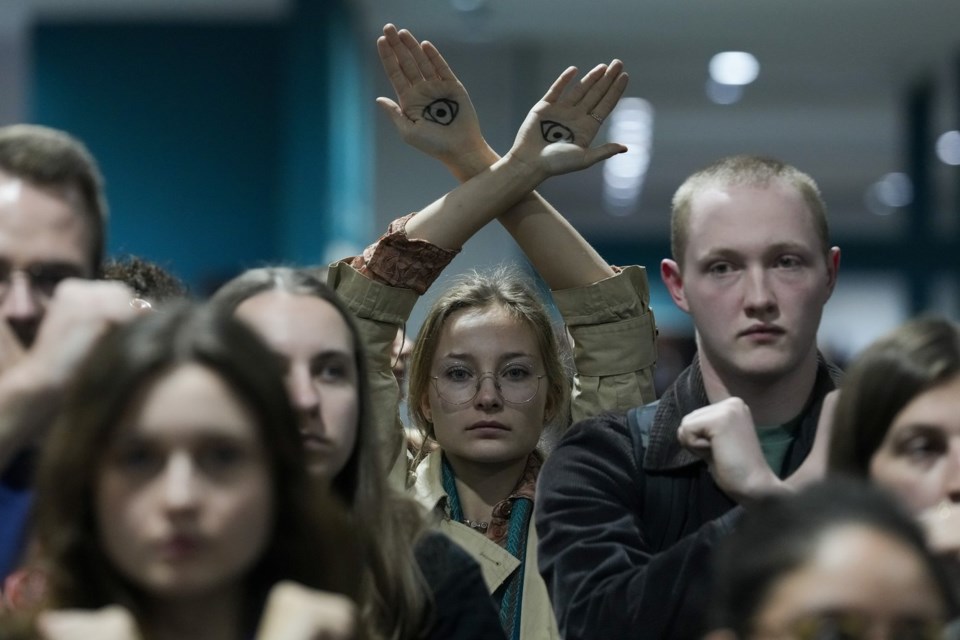BAKU, Azerbaijan (AP) — The United Nations' annual climate talks pushed into overtime Saturday under a cloud of anger and disappointment as negotiators were well short of a deal on money for developing nations to curb and adapt to climate change.
pledged $250 billion annually by 2035, more than double the previous goal of $100 billion set 15 years ago but far short of the annual $1 trillion-plus that experts say is needed. Through the early hours of Saturday morning, The Associated Press saw lead negotiators from the European Union, the United States and other nations going through the empty halls from meeting to meeting as delegates tried to hash out a new version of the deal.
“We're still working hard,” U.S. climate envoy John Podesta told the AP past 4 a.m. local time.
The climate talks, called COP29, in Baku, Azerbaijan, were scheduled to end Friday. Workers have already begun dismantling the venue for the talks.
A climate cash deal is still elusive at the talks
Wealthy nations are obligated to help vulnerable countries under an agreement reached at these talks in Paris in 2015. Developing nations are seeking $1.3 trillion to help adapt to droughts, floods, rising seas and extreme heat, pay for , and transition their energy systems away from planet-warming fossil fuels and toward clean energy.
Representatives of some of the nations that are obliged to contribute the cash said the $250 billion climate finance figure is realistic and reflects their limits at a time when their own economies are stretched.
The amount in any deal reached at COP negotiations — often considered a “core” — will . But much of that means loans for countries drowning in debt.
But that meant little to vulnerable nations, many already battered by extreme weather made worse largely by emissions from the burning of fossil fuels they've had little to do with. Most of those emissions have come from the developed world since the Industrial Revolution.
“Our expectations were low, but this is a slap in the face,” said Mohamed Adow, from Power Shift Africa. “No developing country will fall for this. They have angered and offended the developing world.”
Nikki Reisch, director of the climate and energy program at the Center for International Environmental Law, said the offering was unacceptable not just because the money is low, but because “it’s really designed to escape and evade the legal obligation that developed countries have” to pay for the climate change they have largely caused.
Activists keep pushing for more ambitious deal
Several dozen activists marched in silence outside the halls where delegates meet late Friday, raising and crossing their arms in front of themselves to indicate rejection of the draft text.
With bleary eyes, seated around cold pizza, a group of youth activists chatted to keep each other awake in one of the main halls of the venue.
“All of us are kind of in mourning in a way,” said Jessica Dunne, with the Alliance of Non-Governmental Radical Youth. This is her fourth COP, and along with the other activists present, she’s disappointed and deeply worried about the current deal on offer. But the group said being in community eases the painful emotions that come with a process Dunne called an “abject failure.”
“In these halls tonight, as we’re sitting here and we’re talking and we’re dancing and crying and laughing, it kind of gives you hope that there will be another day that we’re going to fight for,” she said.
“I’m really tired,” said Erica Njuguna, a climate activist from Kenya. “But we are holding the line, making sure that COP delivers for people on the front lines of the climate crisis. So far it hasn’t.”
___
Associated Press journalist Joshua A. Bickel contributed to this report.
___
The Associated Press’ climate and environmental coverage receives financial support from multiple private foundations. AP is solely responsible for all content. Find AP’s for working with philanthropies, a list of supporters and funded coverage areas at .
Melina Walling, Seth Borenstein, Michael Phillis And Sibi Arasu, The Associated Press




